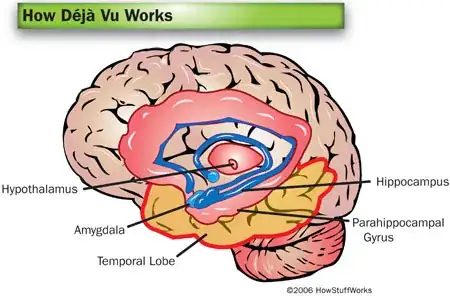From HowStuffWorks:

There are more than 40 theories as to
what déjà vu is and what causes it,
and they range from reincarnation to
glitches in our memory processes.
Déjà vu is extremely difficult to
study because it occurs briefly,
unannounced, only in certain people,
and has no witnesses or physical
manifestations other than the person
saying, "Hey, déjà vu!" Because of
this, there is little firm research
and no definitive explanations.
Firmly placing déjà vu within the
study of memory, [researchers] hope to discover
more about how memories are formed,
stored and retrieved.
They have since determined that the
medial temporal lobe is involved in
our conscious memory.
Double Perception (Divided Attention) Theory
... when we are distracted with
something else, we subliminally take
in what's around us but may not truly
register it consciously. Then, when we
are able to focus on what we are
doing, those surroundings appear to
already be familiar to us even when
they shouldn't be.
The Hologram Theory
Dutch psychiatrist Herman Sno proposed
the idea that memories are like
holograms, meaning that you can
recreate the entire three-dimensional
image from any fragment of the whole.
The smaller the fragment, however, the
fuzzier the ultimate picture.
Déjà vu ... happens when some
detail in the environment we are
currently in (a sight, sound, smell,
et cetera) is similar to some remnant
of a memory of our past and our brain
recreates an entire scene from that
fragment.
Dual Processing (Delayed Vision) Theory
Robert Efron tested an idea at the
Veterans Hospital in Boston in 1963
that stands as a valid theory today.
He proposed that a delayed
neurological response causes déjà vu.
Because information enters the
processing centers of the brain via
more than one path, it is possible
that occasionally that blending of
information might not synchronize
correctly.
... a new study suggests only a small
chunk of [the hippocampus, called the dentate gyrus,
is responsible for “episodic”
memories—information that allows us to
tell similar places and situations
apart.
When Susumu Tonegawa and his team bred
mice without a fully-functional
dentate gyrus, the rodents struggled
to tell the difference between two
similar but different situations.
More to read:
